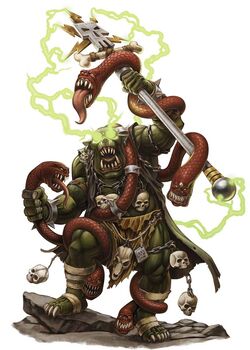
Old Zogwort transforms another unsuspecting foe into a Squig with the power of the WAAAGH!
Old Zogwort is the greatest and most powerful Weirdboy to have ever lived amongst the tribes of the Orks. He is particularly feared for his unprecedented ability to actually mutate his foes into Squigs, which is known as "Old Zogwort's Curse."
History[]
The greatest Weirdboy in Ork history, Zogwort was born during a total eclipse of the sun upon the Death World of Catachan. Zogwort came out of his fungal cocoon already fighting, because his spore had matured within a nest of bloodvipers and, even before he had clawed his way out of the ground, Zogwort's infant Orkoid form had been riddled with infected snake bites. Nevertheless, the whelp survived his injuries.
As the blazing, tropical Catachan sun went down upon the gruesome scene of Zogwort's birth, the young Ork hauled his envenomed body from the dirt, a dead bloodviper serpent in each hand and a tangle of dying snakes writhing in his gaping, blood-filled mouth. To the awe of Zogwort's tribe of Feral Orks, the signs of his favour in the eyes of the Ork gods Gork and Mork did not end with the circumstances of his birth.
From that day forward no snake of any species would strike at Zogwort, though they slithered though his sleeping furs and curled lovingly into the warmth of his scrawny, scarred green body. Zogwort proved to be surlier and far more cunning than his fellow Orks and any that sought to push him around soon discovered that Zogwort's bite could prove to be more toxic than that of any serpent. He was hailed as the favoured son of Mork and rose to high rank in his tribe before even a single Terran year had passed from the day of his violent emergence into the world.
The true extent of Zogwort's power only became apparent when he reached adolescence. Violent psychic phenomena soon began to manifest around Zogwort and many of the older Greenskins collected on their bets in teef that the strange Ork whelp would mature into a Weirdboy. He was assigned to a mob of more mature Ork minders to keep him on a tight leash, although they had the mysterious habit of accidentally turning into Squigs during the night.
When his tribe of Feral Orks finally fell upon the human troops of Catachan's planetary militia, Zogwort proved to be a terror in battle, stomping and whooping as he soaked up the raw psychic WAAAGH! energy the tribe generated at war. When Zogwort could bear it no more, this energy would burst forth from his body in a blinding cascade of pure viridian light that blasted the foe, leaving nothing but empty clothes, dropped equipment and extremely puzzled Squigs in its wake.
Zogwort later burned out his eyeballs in a particularly powerful psychic blast that destroyed an entire Astra Militarum company, though to this day he claims that he meant to do that and that Mork guided his path in releasing that much energy. As he reached full maturity and became a dour, belligerent curmudgeon, Zogwort's fame soon surpassed even that of his Warboss, Skabgutz. He left Catachan behind, taking many of his Squigs and snake pets with him on a quest to find even larger groups of Orks whose collective energy could fuel his powers to unprecedented heights.
Old Zogwort now plies the galaxy as an Ork Freebooter, going wherever the WAAAGH! energy is most pure, basking in the psychic power of his fellow Greenskins and unleashing it at the slightest opportunity. He has proved to be the power behind the throne of many an Ork Warlord and his legend among the Greenskins grows with every passing battle. After all, what Ork will not cheer to hear of their greatest foes transformed into mewling Squigs?
Wargear[]
Old Zoghead's body is suffused with deadly serpent venom and he has the ability to place this toxin on any weapon he uses, which can prove deadly to his opponents. Even more devastating is what is known among the Orks as "Old Zogwort's Curse," which is his unprecedented psychic ability to mutate any opponent without adequate protection from psychic forces into a Squig. Imperial forces are warned to beware of this xenos witchery.
Sources[]
- Codex: Orks (7th Edition), pg. 223
- Codex: Orks (4th Edition), pg. 61
